[Dec 2007, Volume 4 Quarterly Issue] Pdf File size - The IIPM Think ...
[Dec 2007, Volume 4 Quarterly Issue] Pdf File size - The IIPM Think ...
[Dec 2007, Volume 4 Quarterly Issue] Pdf File size - The IIPM Think ...
You also want an ePaper? Increase the reach of your titles
YUMPU automatically turns print PDFs into web optimized ePapers that Google loves.
REIMAGINING INDIA<br />
of globalization, for media gurus to triumphantly<br />
embrace the market as the<br />
panacea for all our ills. But it requires<br />
some humility to recognize that economic<br />
policy making, doing economics and<br />
shaping public policy in the context of<br />
poor and developing societies as ours,<br />
requires also a deep sense of humanity.<br />
A central issue in discussing the role of<br />
the state and economic growth is the issue<br />
about balanced growth, to avoid<br />
growing disparities between states, between<br />
regions and between different sectors<br />
of the population. For example, one<br />
of the major points of criticism by market<br />
friendly economic reformers’ is that<br />
policy and theoretical approaches, based<br />
on ‘balanced growth’, has been the bane<br />
of earlier economic policy making. Sukhamoy<br />
Chakravarty one of our foremost<br />
economists and who engaged in policy<br />
with that deep sense of humanity, in dismissing<br />
the debate about ‘balanced and<br />
unbalanced growth’ as semantic, refers<br />
ence to discussions of trade as a major<br />
engine for growth and like Amartya Sen,<br />
he recognizes “cycles of optimism and<br />
pessimism in trade led growth”. As Sukhamoy<br />
Chakravarty says, “the point I<br />
am driving at is that it was not much due<br />
to the alleged doctrine of ‘market failures’<br />
in the sense indicated by fundamental<br />
theorems of welfare economics that<br />
policy-makers in both developed and developing<br />
countries agreed to a theory of<br />
state-directed industrialization, but from<br />
a growth perspective based on data on<br />
massive agrarian overpopulation in<br />
South and Eastern Europe. Obviously<br />
the extension of this argument to deal<br />
<strong>The</strong> need to forge the new consensus that Sukhamoy<br />
Chakravorty made a plea for in the 1980s is ironically<br />
even more relevant now in the end of the first decade of<br />
the new millennium<br />
to the problem of surplus labour as a<br />
more serious conceptual and policy issue<br />
to deal with, especially in rural areas.<br />
Economist of the intellectual caliber of<br />
Sukhamoy Chakravarty, in addressing<br />
such critical issues as that of surplus labour<br />
also dealt with the problem of the<br />
state. With regard to debate about the<br />
state he points to the compatibility or<br />
otherwise between the planning principle<br />
and the principle of comparative advantage.<br />
A dichotomy which he says has<br />
been misleadingly drawn. This has refer-<br />
with countries like India was done later,<br />
although it was present in a general way<br />
from the beginning”. So much for the arguments<br />
about socialist inspired penchant<br />
for state involvement in economic<br />
planning and growth. In connection with<br />
the extension of the argument on surplus<br />
labour to underdeveloped areas, he refers<br />
to the UN Expert Group Report of<br />
1951 on 'Measures for the Economic Development<br />
of Underdeveloped Areas.<br />
'Chakravarty says, “this report reflected<br />
the emergence of a ‘development consensus’<br />
which lasted for nearly twenty five<br />
years”. He then refers to the breakdown<br />
of the consensus – “more prominently in<br />
the 1980s, based on criticisms which were<br />
first voiced by a resurgent neo-classicism<br />
on the one hand, and a ‘radical critique’<br />
of the left on the other”. This he says<br />
does not imply a demise of the sub-discipline<br />
of ‘development economics’, but,<br />
“the need to forge a new consensus” (emphasis<br />
added). <strong>The</strong> need to forge the new<br />
consensus that Sukhamoy Chakravorty<br />
made a plea for in the 1980s is ironically<br />
even more relevant now in the end of the<br />
first decade of the new millennium.<br />
We must consider ourselves very fortunate,<br />
that our nation has been blessed<br />
with a whole number of good, intellectually<br />
honest economists. In the context of<br />
looking at the perspectives of economic<br />
theory and policy, there is much that we<br />
can glean from the insightful writings of<br />
economists like the late Sukhamoy<br />
Chakravarty, (who along with Amartya<br />
Sen) belongs to that unique class of intellectually<br />
honest economists who have not<br />
done their economics only to pander to<br />
the tunes of the times. Economists who<br />
always did their theoretical and practical<br />
policy work, not only standing above<br />
vested interest pulls and pushes but also<br />
with a deep sense of humanity unconcerned<br />
whether that got them applause<br />
from the galleries or not. Sukhamoy<br />
Chakravarty’s contributions in the context<br />
of the discussion on state and markets<br />
are several and relate to the role of<br />
knowledge, the significance of coordination<br />
failure and surplus labour, the need<br />
to go beyond ‘the market failure’ or stages<br />
of growth argument, the impact of<br />
economic organizations from the viewpoint<br />
of “ensuring creativity, growth and<br />
18 THE <strong>IIPM</strong> THINK TANK


![[Dec 2007, Volume 4 Quarterly Issue] Pdf File size - The IIPM Think ...](https://img.yumpu.com/29766298/17/500x640/dec-2007-volume-4-quarterly-issue-pdf-file-size-the-iipm-think-.jpg)
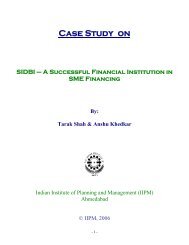
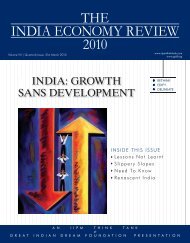
![[Feb 2008, Volume V Annual Issue] Pdf File size - The IIPM Think Tank](https://img.yumpu.com/43961117/1/190x245/feb-2008-volume-v-annual-issue-pdf-file-size-the-iipm-think-tank.jpg?quality=85)
![[June 2008, Volume V Quarterly Issue] Pdf File size - The IIPM Think ...](https://img.yumpu.com/41693247/1/190x245/june-2008-volume-v-quarterly-issue-pdf-file-size-the-iipm-think-.jpg?quality=85)
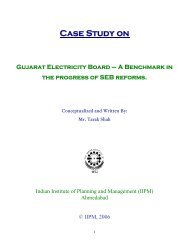
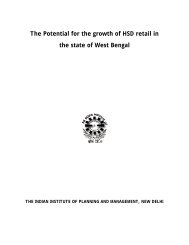
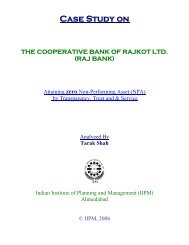

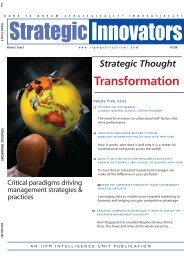
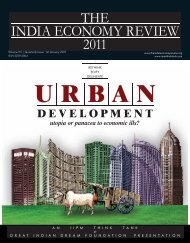
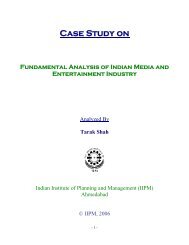
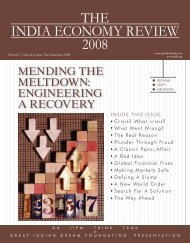
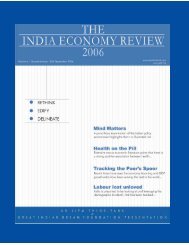
![[Volume VI | Quarterly Issue: 31st May 2009] Pdf File size](https://img.yumpu.com/27796051/1/190x245/volume-vi-quarterly-issue-31st-may-2009-pdf-file-size.jpg?quality=85)